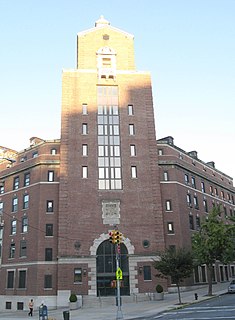
Abraham Joshua Heschel was a Polish-born American rabbi and one of the leading Jewish theologians and Jewish philosophers of the 20th century. Heschel, a professor of Jewish mysticism at the Jewish Theological Seminary of America, authored a number of widely read books on Jewish philosophy and was a leader in the civil rights movement.

Conservative Judaism is a Jewish religious movement that regards the authority of Jewish law and tradition as emanating primarily from the assent of the people and the community through the generations, more than from divine revelation. It therefore views Jewish law, or halakha, as both binding and subject to historical development. The Conservative rabbinate employs modern historical-critical research, rather than only traditional methods and sources, and lends great weight to its constituency when determining its stance on matters of practice. The movement considers its approach as the authentic and most appropriate continuation of halakhic discourse, maintaining both fealty to received forms and flexibility in their interpretation. It also eschews strict theological definitions, lacking a consensus in matters of faith and allowing great pluralism.

Shabbat or the Sabbath, also called Shabbos by Ashkenazim, is Judaism's day of rest on the seventh day of the week—i.e., Saturday. On this day, religious Jews remember the biblical stories describing the creation of the heaven and earth in six days and the redemption from slavery and The Exodus from Egypt, and look forward to a future Messianic Age. Since the Jewish religious calendar counts days from sunset to sunset, Shabbat begins in the evening of what on the civil calendar is Friday.

Benjamin West, was a British-American artist who painted famous historical scenes such as The Death of Nelson, The Death of General Wolfe, the Treaty of Paris, and Benjamin Franklin Drawing Electricity from the Sky.

The Babylonian calendar was a lunisolar calendar with years consisting of 12 lunar months, each beginning when a new crescent moon was first sighted low on the western horizon at sunset, plus an intercalary month inserted as needed by decree. The calendar is based on a Sumerian predecessor preserved in the Umma calendar of Shulgi.

Eliezer Ben‑Yehuda was a Hebrew lexicographer and newspaper editor. He was the driving force behind the revival of the Hebrew language in the modern era.
Congregation Tifereth Israel of Glen Cove, New York was founded in 1897 and is the oldest continuously operating Jewish house of worship on Long Island outside New York City.

Paradesi Jews were Jewish people who immigrated to the Indian subcontinent during the 15th and 16th centuries following the expulsion of Jews from Spain. Paradesi refers to the Malayalam word that means foreign as they were newcomers. These Sephardic immigrants fled forced conversion, persecution and antisemitism in the wake of the Alhambra Decree expelling Jews from Spain, and King Manuel's 1496 decree expelling Jews from Portugal. They are sometimes referred to as "White Jews", although that usage is generally considered pejorative or discriminatory and refers to relatively recent Jewish immigrants, predominantly Sephardim.

Joseph Herman Hertz was a British Rabbi and biblical scholar. He held the position of Chief Rabbi of the United Kingdom from 1913 until his death in 1946, in a period encompassing both world wars and the Holocaust.
The Twelve Tribes of Israel are, according to Judeo-Christian texts, the descendants of the Biblical patriarch Jacob, also known as Israel, through his twelve sons by various women, who collectively form the Israelite nation. Within ancient Judaism, one's tribal affiliation had a great impact on his or her practices and opportunities, as some tribes enjoyed privileges others did not and some tribes received more blessings than others. Some modern scholars dispute whether there ever were (exactly) twelve Israelite tribes, and think that the number 12 more likely signifies a symbolic invented tradition as part of a national founding myth.

Joshua Aaron Cohen is an American novelist and story writer, best known for his works Witz (2010), Book of Numbers (2015), and Moving Kings (2017).

The history of the Jews in Cincinnati occupies a prominent place in the development of Jewish secular and religious life in the United States. Cincinnati is not only the oldest Jewish community west of the Allegheny Mountains but has also been an institutional center of American Reform Judaism for more than a century. The Israelite, the oldest American Jewish newspaper still (2019) being published, began publication in Cincinnati in 1854.

Congregation Mikveh Israel, "Holy Community of the Hope of Israel", is a synagogue in Philadelphia, Pennsylvania that traces its history to 1740. Mikveh Israel is a Spanish and Portuguese synagogue that follows the rite of the Amsterdam esnoga. It is the oldest synagogue in Philadelphia, and among the oldest in the United States.

Jewish mythology is the body of myths associated with Judaism. Elements of Jewish mythology have had a profound influence on Christian mythology and on Islamic mythology, as well as on world culture in general. Christian mythology directly inherited many of the narratives from the Jewish people, sharing in common the narratives from the Old Testament. Islamic mythology also shares many of the same stories; for instance, a creation-account spaced out over six periods, the legend of Abraham, the stories of Moses and the Israelites, and many more.
In Judaism, a person who is shomer Shabbat or shomer Shabbos is a person who observes the mitzvot (commandments) associated with Judaism's Shabbat, or Sabbath, which begins at dusk on Friday and ends after sunset on Saturday.

Temple Beth Elohim is a Reform synagogue located at 230 Screven Street in Georgetown, South Carolina.

The Slave is a novel by Isaac Bashevis Singer originally written in Yiddish that tells the story of Jacob, a scholar sold into slavery in the aftermath of the Khmelnytsky massacres, who falls in love with a gentile woman. Through the eyes of Jacob, the book recounts the history of Jewish settlement in Poland at the end of the 17th century. While most of the book's protagonists are Jews, the book is also a criticism of Orthodox Jewish society. The English version was translated by the author and Cecil Hemley.

Few Jews arrived in Baltimore, Maryland, in its early years. As an immigrant port of entry and border town between North and South and as a manufacturing center in its own right, Baltimore has been well-positioned to reflect developments in American Jewish life. Yet, the Jewish community of Baltimore has maintained its own distinctive character as well.















